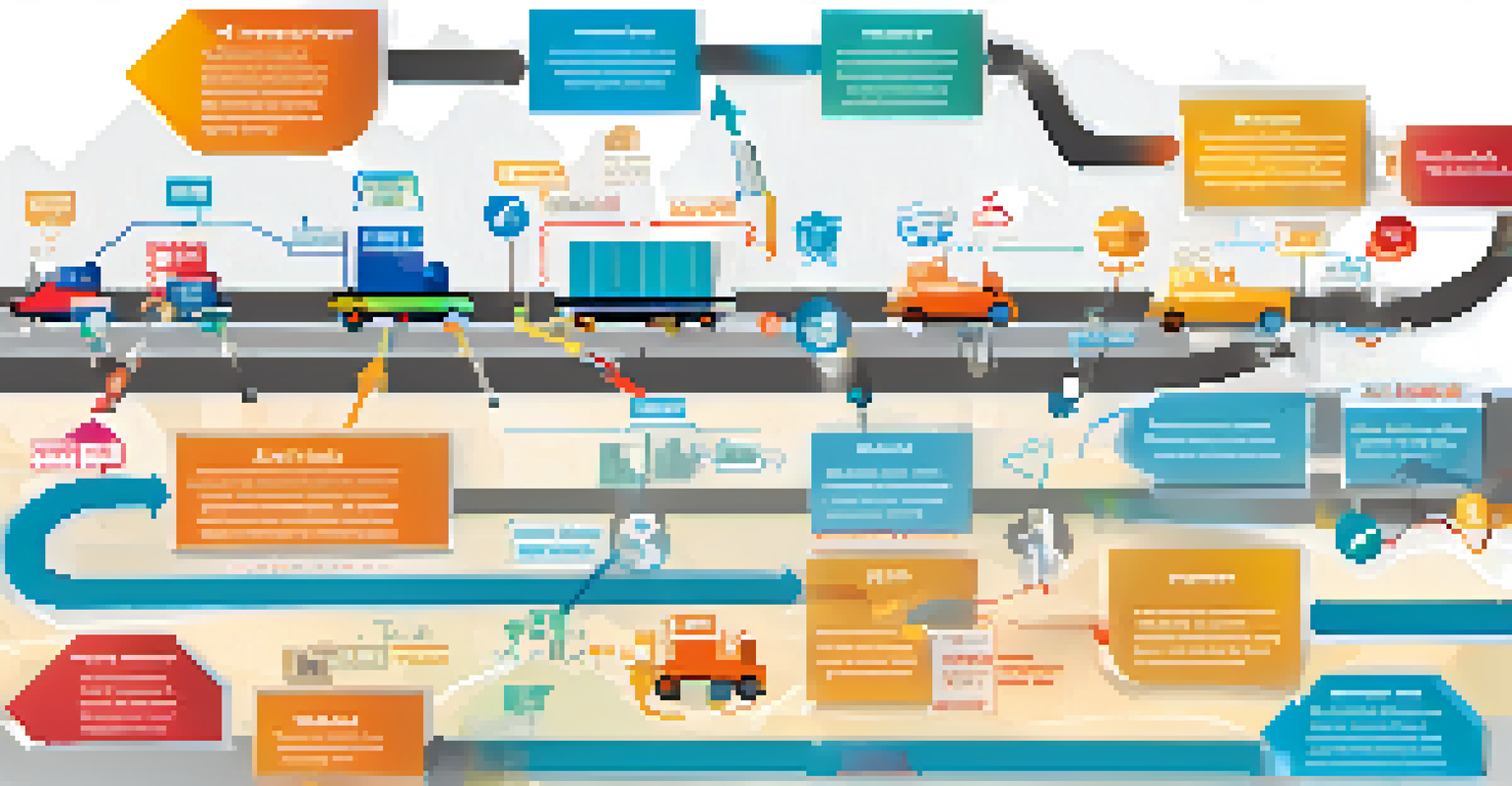The Impact of Blockchain on Supply Chain Cost Reduction

Understanding Blockchain Technology in Supply Chains
Blockchain is a decentralized digital ledger that records transactions across multiple computers. This technology ensures that the data remains secure and unalterable, providing transparency in supply chain operations. By enabling all parties to access real-time information, blockchain can streamline processes and enhance communication.
Blockchain technology is a revolution that can enhance the efficiency of supply chains and reduce costs significantly.
For instance, instead of relying on multiple intermediaries to verify transactions, blockchain allows users to verify them instantly. This shift eliminates delays and reduces the risk of errors that often lead to increased costs. By fostering trust among participants, blockchain encourages collaboration, which can optimize the entire supply chain.
In essence, understanding how blockchain operates is crucial to appreciating its potential impact on cost reduction. As companies begin to adopt this technology, they can expect to see significant improvements in efficiency and profitability.
Enhancing Transparency and Traceability with Blockchain
One of the standout features of blockchain is its ability to provide transparency and traceability. Each transaction is recorded on a block, which is then linked to previous blocks, creating a chain of information that is accessible to all stakeholders. This level of visibility can significantly reduce disputes and enhance accountability.

For example, if a product is recalled due to safety concerns, blockchain allows companies to trace the product's journey back to its source. This rapid identification helps minimize losses and ensures that only affected items are pulled from shelves, saving both time and money. Such traceability can also assist in regulatory compliance, further reducing potential fines.
Blockchain Boosts Supply Chain Trust
By providing secure, real-time access to transaction data, blockchain fosters trust and collaboration among supply chain participants.
Ultimately, enhanced transparency means fewer surprises down the line, leading to more predictable costs and improved operational efficiency for businesses.
Reducing Fraud and Errors in Supply Chain Transactions
Fraud and errors in supply chain transactions can lead to significant financial losses. Blockchain helps mitigate these risks by creating a secure and immutable record of all transactions. Once data is entered into the blockchain, it cannot be altered without consensus from all parties involved, making it extremely difficult for fraud to occur.
The transparency and traceability offered by blockchain can help businesses streamline their operations and improve accountability.
Take, for instance, the problem of counterfeit goods. With blockchain, each product can be verified through its unique digital fingerprint, ensuring that consumers receive authentic items. This verification not only protects brand integrity but also reduces the costs associated with handling returns or legal disputes over counterfeit products.
By minimizing fraud and errors, blockchain technology can lead to substantial cost savings, allowing businesses to focus their resources on growth rather than on damage control.
Streamlining Processes and Reducing Administrative Costs
Administrative costs can quickly pile up in any supply chain due to paperwork, data entry, and manual tracking. Blockchain technology automates many of these processes by providing a single source of truth for all transactions. This automation reduces the need for intermediaries and minimizes human error.
For example, smart contracts, which are self-executing contracts with the terms directly written into code, can automatically trigger actions when certain conditions are met. This means that payments can be processed instantly, reducing delays and associated costs. By streamlining operations in this manner, companies can free up resources for more strategic initiatives.
Improved Transparency Reduces Costs
The traceability offered by blockchain allows companies to quickly identify issues, minimizing losses and ensuring regulatory compliance.
In summary, blockchain not only enhances operational efficiency but also leads to a noticeable reduction in administrative costs—an essential factor for any business looking to improve its bottom line.
Optimizing Inventory Management Through Real-Time Data
Effective inventory management is critical for controlling costs in supply chains. Blockchain provides real-time data about inventory levels, allowing companies to make informed decisions about when to reorder stock. This capability helps prevent both overstock and stockouts, leading to lower holding costs.
Imagine a scenario where a retailer can see in real-time how much of a product is available at each location. Instead of relying on estimates or historical data, they can adjust orders based on actual demand. This approach not only reduces waste but also ensures that customers find what they need, enhancing satisfaction and loyalty.
Therefore, the ability to optimize inventory management through blockchain can lead to significant cost reductions and improve overall service quality.
Enhancing Collaboration Among Supply Chain Partners
Collaboration is key to a successful supply chain, but differing systems and processes can create barriers. Blockchain fosters collaboration by providing a unified platform where all partners can access the same data. This shared knowledge base encourages teamwork and streamlines communication.
For instance, suppliers, manufacturers, and retailers can share insights and data through a blockchain network, allowing for more coordinated planning and execution. This enhanced collaboration helps reduce delays and misunderstandings, ultimately leading to cost reductions across the board. By working together more effectively, partners can identify inefficiencies and address them promptly.
Streamlined Processes Cut Admin Costs
Automation through blockchain, including the use of smart contracts, significantly lowers administrative expenses by eliminating manual tracking and paperwork.
In essence, blockchain's ability to enhance collaboration transforms supply chains into cohesive units, driving down costs while improving performance.
The Future of Supply Chain Cost Reduction with Blockchain
As technology continues to evolve, the potential for blockchain to transform supply chains is immense. Companies that embrace this technology can expect to see ongoing improvements in cost efficiency and operational effectiveness. The future will likely bring even more innovative applications of blockchain in logistics and supply chain management.
For example, we may see advancements in artificial intelligence (AI) and machine learning being integrated with blockchain for predictive analytics. This combination can provide insights into market trends and consumer behavior, allowing businesses to make proactive decisions that further reduce costs. The potential for growth and efficiency is exciting for the industry.

In conclusion, the future of supply chain management is bright, and blockchain will undoubtedly play a pivotal role in driving down costs while enhancing overall effectiveness.